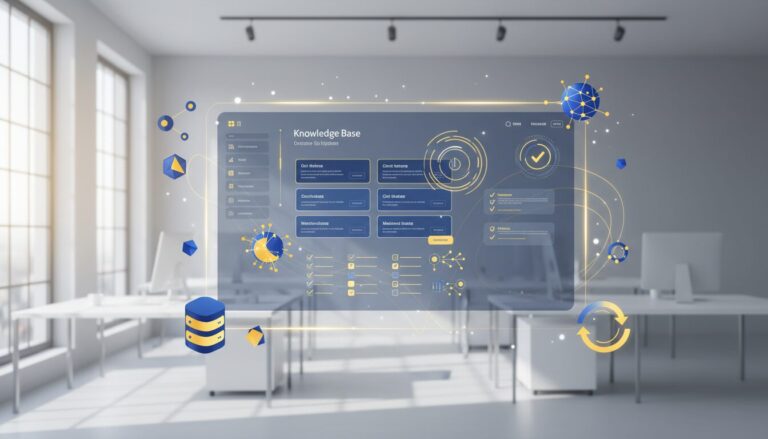- Introduction to AI Agents in Business
- What Are AI Agents and Why Do Businesses Need Them?
- Key Features to Consider When Choosing AI Agent Platforms
- Top AI Agent Platforms Compared
- Implementation Strategies and Best Practices
- Future Trends in Business AI Agents
- Conclusion
The business landscape is being rapidly transformed by AI agent technologies, creating both opportunities and challenges for organizations of all sizes. These intelligent software entities are revolutionizing how companies handle operations, customer service, data analysis, and decision-making processes. But with numerous platforms available—each offering different capabilities, pricing models, and technical requirements—how do you determine which AI agent platform is right for your specific business needs?
This comprehensive guide cuts through the complexity by comparing the top AI agent platforms available today. We’ll examine their core functionalities, ease of implementation, scalability options, and unique value propositions. Whether you’re a small business looking to automate customer interactions, a growing company seeking data-driven insights, or an enterprise requiring sophisticated AI integration, this comparison will help you navigate the increasingly crowded AI agent marketplace.
Most importantly, we’ll highlight solutions that don’t require extensive coding knowledge or AI expertise, democratizing access to these powerful tools for businesses of all technical capabilities. Let’s explore how the right AI agent platform can transform your business operations and create competitive advantages in today’s AI-driven economy.
AI Agent Platforms for Business
A comprehensive comparison of leading solutions
What Are AI Agents?
Autonomous software systems that perform specific tasks, make decisions, and solve problems with minimal human intervention. Unlike basic automation, AI agents learn from data and adapt to new situations over time.
Business Benefits
- Efficiency: 24/7 operation without breaks
- Customer Experience: Immediate, personalized responses
- Data Insights: Pattern recognition from vast information
- Scalability: Handle fluctuating demands without additional staff
Types of AI Agent Platforms
No-Code Platforms
- Intuitive visual interfaces
- Rapid development (5-10 mins)
- No technical knowledge needed
- Example: Estha
Enterprise Solutions
- Advanced customization
- Robust security features
- Dedicated technical resources
- Examples: IBM Watson, Azure AI
Industry-Specialized
- Pre-trained for specific use cases
- Deep vertical integration
- Tailored functionality
- Examples: Salesforce Einstein, UiPath
Key Features Comparison
| Platform Type | Ease of Use | Integration | Intelligence |
|---|---|---|---|
| No-Code (Estha) | ★★★★★ | ★★★★☆ | ★★★★☆ |
| Enterprise | ★★☆☆☆ | ★★★★★ | ★★★★★ |
| Specialized | ★★★☆☆ | ★★★☆☆ | ★★★★☆ |
Implementation Best Practices
1. Clear Objectives
Start with specific business problems to solve rather than adopting technology for its own sake.
2. Phased Approach
Begin with pilot projects before expanding to enterprise-wide implementation.
3. User Experience
Prioritize intuitive interfaces and seamless interactions for higher adoption rates.
4. Continuous Improvement
Establish KPIs and regular review cycles to optimize performance over time.
Future Trends in AI Agents
Multi-Agent Systems
Collaborative networks of specialized agents working together to solve complex problems.
Emotional Intelligence
AI agents that recognize and respond appropriately to user emotions for more natural interactions.
Democratized AI
No-code platforms enabling domain experts to create specialized AI agents without technical assistance.
What Are AI Agents and Why Do Businesses Need Them?
AI agents are autonomous or semi-autonomous software systems designed to perform specific tasks, make decisions, or solve problems with minimal human intervention. Unlike basic automation tools that follow rigid rules, AI agents can learn from data, adapt to new situations, and improve their performance over time.
These intelligent systems represent a significant evolution from traditional business software. While conventional programs require explicit instructions for every possible scenario, AI agents can handle ambiguity, recognize patterns, and operate within parameters while adjusting their approaches based on results and interactions.
Types of Business AI Agents
Business AI agents generally fall into several categories based on their primary functions:
Conversational Agents: These include customer service chatbots, virtual assistants, and interactive knowledge bases that communicate with users in natural language. They can handle inquiries, provide information, collect data, and escalate complex issues to human representatives when necessary.
Process Agents: These AI entities automate workflows, monitor systems, analyze operations, and optimize business processes. They excel at identifying inefficiencies and suggesting improvements across organization systems.
Analytical Agents: Specialized in processing large volumes of data, these agents identify trends, generate insights, and support data-driven decision making. They transform raw information into actionable business intelligence.
Decision Support Agents: These sophisticated systems help management evaluate options, assess risks, and make strategic decisions by processing multiple variables and potential outcomes simultaneously.
The Business Case for AI Agents
Organizations implement AI agents for compelling reasons that directly impact their bottom line:
Efficiency and Cost Reduction: AI agents automate routine tasks that would otherwise consume employee time, reducing operational costs while increasing productivity. They can operate 24/7 without breaks, ensuring continuous business processes.
Enhanced Customer Experience: Intelligent agents provide immediate responses to customer inquiries, personalized recommendations, and consistent service across all touchpoints. This responsiveness builds customer satisfaction and loyalty.
Data-Driven Insights: By processing vast amounts of information, AI agents uncover valuable patterns and trends that might otherwise remain hidden, enabling smarter business decisions and strategic planning.
Scalability: AI agents can handle fluctuating workloads without the need to hire or reassign human resources, making them particularly valuable for businesses with seasonal demands or rapid growth.
Key Features to Consider When Choosing AI Agent Platforms
Selecting the right AI agent platform requires careful evaluation of several critical factors that will determine both implementation success and long-term value:
Ease of Development and Customization
The technical barrier to entry varies significantly across platforms. Traditional AI development often requires specialized coding skills, machine learning expertise, and significant development resources. However, the emergence of no-code and low-code platforms has democratized AI agent creation, allowing business professionals without technical backgrounds to build sophisticated solutions.
When evaluating platforms, consider whether you need a solution that can be implemented by existing team members or if you’ll require specialized technical talent. Platforms with intuitive interfaces, drag-and-drop functionality, and pre-built components can dramatically reduce development time and total cost of ownership.
Integration Capabilities
For AI agents to deliver maximum value, they must connect seamlessly with your existing business systems. Look for platforms offering robust API support, pre-built connectors for popular business applications, and flexible integration options. The ability to access data from CRM systems, ERP platforms, communication tools, and other business software will determine how effectively your AI agents can operate within your overall technology ecosystem.
Scalability and Performance
As your business grows and AI usage expands, your chosen platform must scale accordingly. Evaluate platforms based on their ability to handle increasing workloads, user numbers, and data volumes without performance degradation. Cloud-based solutions typically offer greater scalability compared to on-premises options, with the ability to allocate additional resources as needed.
Intelligence and Learning Capabilities
The “intelligence” in AI agents varies dramatically across platforms. Some offer sophisticated machine learning that continuously improves performance based on interactions and outcomes, while others provide more static rule-based functionality with limited adaptation. Consider whether your business needs agents that can evolve over time or if more predictable, consistent behavior is preferred.
Security, Privacy, and Compliance
AI agents often process sensitive business and customer information, making security features critically important. Evaluate platforms based on their data encryption standards, access controls, compliance certifications (such as GDPR, HIPAA, or SOC 2), and transparency regarding data usage. For regulated industries, choosing platforms with robust compliance features can prevent costly violations.
Top AI Agent Platforms Compared
The AI agent platform market offers solutions spanning from accessible no-code tools to sophisticated enterprise systems. We’ve categorized the leading options to help you identify which type best suits your organization’s needs, technical capabilities, and strategic objectives.
No-Code AI Agent Platforms
These platforms democratize AI development by enabling non-technical users to create functional AI agents through intuitive interfaces and visual programming. They’re ideal for small to medium businesses, departments within larger organizations, and companies without dedicated technical teams.
Estha: As a revolutionary no-code AI platform, Estha stands out for its ability to empower anyone to create custom AI applications in just 5-10 minutes. Using an intuitive drag-drop-link interface, users across diverse industries can build personalized AI solutions including chatbots, expert advisors, interactive quizzes, and virtual assistants without any coding knowledge. Estha provides a complete ecosystem through EsthaLEARN, EsthaLAUNCH, and EsthaeSHARE, allowing users to not only build and embed AI apps but also monetize their creations.
Key Advantages:
– Exceptionally user-friendly interface requiring zero technical knowledge
– Rapid development cycle (5-10 minutes for functional applications)
– Complete ecosystem supporting education, deployment, and monetization
– Ability to create agents that reflect unique expertise and brand voice
Ideal For: Content creators, educators, small business owners, healthcare professionals, and any professional looking to quickly implement customized AI solutions without technical resources.
Zapier: While primarily an automation platform, Zapier’s integration capabilities allow users to create basic AI workflows connecting various applications and services. Its straightforward interface makes it accessible to non-technical users.
Key Advantages:
– Extensive integration library with 3,000+ applications
– Simple trigger-action workflow creation
– Low learning curve for basic automation
Ideal For: Businesses seeking to automate simple workflows with basic AI functionality integrated into existing software tools.
Bubble: This visual programming platform allows for the creation of web applications with integrated AI capabilities. While more complex than pure no-code AI platforms, it offers greater flexibility for creating custom interfaces.
Key Advantages:
– Responsive web application creation with AI components
– More customizable than pure no-code solutions
– Supportive community and extensive documentation
Ideal For: Businesses wanting to build custom web applications with embedded AI functionality who have some technical comfort but limited coding expertise.
Enterprise AI Agent Solutions
Enterprise platforms offer comprehensive AI capabilities, advanced customization, and robust scalability suited for large organizations with complex requirements and dedicated technical resources.
IBM Watson Assistant: A mature enterprise-grade conversational AI platform that combines natural language understanding with machine learning capabilities. It offers deep customization options and integration with IBM’s broader AI ecosystem.
Key Advantages:
– Advanced natural language processing capabilities
– Robust security and compliance features
– Enterprise-grade scalability and reliability
– Rich analytics and insight generation
Ideal For: Large enterprises with dedicated technical teams seeking sophisticated AI agents with extensive customization capabilities.
Microsoft Azure AI: Microsoft’s comprehensive AI platform provides tools for building, training, and deploying AI agents across various use cases. It integrates seamlessly with Microsoft’s broader ecosystem of business tools.
Key Advantages:
– Comprehensive AI services including cognitive, language, and decision capabilities
– Strong integration with Microsoft’s business suite (Office 365, Dynamics, etc.)
– Enterprise-grade security and compliance
– Hybrid deployment options (cloud and on-premises)
Ideal For: Organizations heavily invested in Microsoft technologies seeking AI agents that integrate with their existing technology stack.
Google Cloud AI Platform: Google’s enterprise AI offering provides sophisticated tools for creating agents with advanced machine learning capabilities, particularly in natural language processing and predictive analytics.
Key Advantages:
– State-of-the-art machine learning capabilities
– Powerful natural language processing and translation
– Extensive analytics and data processing capabilities
– Scalable cloud infrastructure
Ideal For: Organizations requiring sophisticated AI capabilities, particularly for language processing, translation, and advanced analytics.
Industry-Specialized AI Platforms
These platforms focus on specific industries or business functions, offering pre-trained models and specialized capabilities tailored to particular use cases.
Salesforce Einstein: Integrated directly into the Salesforce CRM platform, Einstein provides sales, service, and marketing teams with AI-powered insights, predictions, and automation capabilities specifically designed for customer relationship management.
Key Advantages:
– Seamless integration with Salesforce CRM
– Industry-specific predictions and recommendations
– Automated lead scoring and opportunity insights
– Customer service optimization
Ideal For: Salesforce customers seeking to enhance their CRM capabilities with AI functionality without significant additional implementation.
UiPath: Focusing on robotic process automation (RPA) with AI capabilities, UiPath allows businesses to create intelligent agents that perform repetitive tasks across various business applications.
Key Advantages:
– Strong process automation capabilities enhanced with AI
– Ability to work with existing business applications
– Visual process designer with reusable components
– Enterprise-grade security and governance
Ideal For: Organizations focused on automating business processes with AI-enhanced capabilities, particularly for operations and back-office functions.
Implementation Strategies and Best Practices
Successful AI agent implementation extends beyond platform selection to encompass strategic planning, thoughtful execution, and ongoing optimization. Follow these best practices to maximize your return on investment:
Start with Clear Business Objectives
Begin by identifying specific business problems or opportunities that AI agents can address. Define measurable objectives such as cost reduction targets, customer satisfaction improvements, or efficiency gains. This focused approach prevents “solution looking for a problem” scenarios and ensures your AI initiative delivers tangible value.
Adopt a Phased Implementation Approach
Rather than attempting a comprehensive enterprise-wide deployment, consider starting with a pilot project in a defined area. This allows you to demonstrate value quickly, refine your approach, and build organizational support before expanding. For example, you might begin with a customer service chatbot for handling basic inquiries before developing more complex AI agents for other departments.
Prioritize User Experience and Adoption
The most technically impressive AI agent will fail if users—whether customers or employees—find it difficult or frustrating to use. Design your AI agents with intuitive interfaces, clear communication patterns, and appropriate escalation paths to human assistance when needed. Involve end-users in testing and refinement to ensure the solution meets their actual needs.
Establish Governance and Oversight
As AI agents become integral to business operations, establishing proper governance becomes essential. Develop policies addressing data usage, decision boundaries (what AI can decide autonomously versus what requires human approval), performance monitoring, and ethical considerations. Regular reviews ensure your AI agents continue to operate as intended and align with organizational values.
Plan for Continuous Improvement
AI agent deployment is not a one-time project but an ongoing program requiring regular assessment and refinement. Establish key performance indicators (KPIs) to evaluate effectiveness, collect user feedback, analyze interaction data, and implement iterative improvements. This continuous optimization cycle maximizes long-term value and keeps your AI capabilities competitive.
Future Trends in Business AI Agents
The landscape of AI agent technologies continues to evolve rapidly, with several emerging trends poised to reshape business applications in the coming years:
Multi-Agent Systems: Rather than isolated AI agents handling discrete tasks, future implementations will increasingly feature collaborative networks of specialized agents working together. These ecosystems will allow for more complex problem-solving, with different agents handling various aspects of business processes while sharing information and coordinating actions.
Emotional Intelligence: Next-generation AI agents will move beyond functional intelligence to incorporate emotional intelligence capabilities. This includes recognizing user emotions through text analysis, voice pattern recognition, and even visual cues, then adapting responses accordingly to provide more empathetic and effective interactions.
Autonomous Decision-Making: As organizations gain confidence in AI capabilities and governance frameworks mature, business AI agents will receive greater decision-making authority. This evolution will progress from purely advisory roles to making and implementing routine business decisions independently within carefully defined parameters.
Democratized AI Development: The trend toward no-code and low-code platforms will accelerate, further reducing barriers to AI implementation. Domain experts in finance, healthcare, marketing, and other fields will increasingly create specialized AI agents without technical assistance, leading to proliferation of purpose-built business AI solutions.
Decentralized AI: Blockchain and decentralized technologies will influence AI agent development, creating systems with greater transparency, auditability, and distributed control. This approach addresses concerns about AI governance and enables new models for collaborative AI development across organizational boundaries.
Conclusion
The AI agent landscape offers unprecedented opportunities for businesses to enhance operations, improve customer experiences, and gain competitive advantages. From accessible no-code platforms like Estha that democratize AI development to sophisticated enterprise solutions that enable complex applications, organizations of all sizes now have viable options for implementing AI agents tailored to their specific needs.
As you evaluate platforms, remember that successful implementation depends not just on the technology itself but on strategic alignment with business objectives, thoughtful design, proper governance, and commitment to continuous improvement. The ideal platform balances your current technical capabilities, immediate business needs, and long-term strategic vision.
The organizations that will thrive in the coming years are those that view AI agents not as mere automation tools but as transformative business capabilities that can evolve alongside changing market demands. By selecting the right platform and implementing it with clear purpose, you position your business to harness the full potential of AI agents—creating more intelligent, responsive, and efficient operations that deliver lasting competitive advantage.
Whether you’re taking your first steps into AI implementation or looking to enhance existing capabilities, the diverse ecosystem of platforms ensures you can find a solution that matches your specific requirements, technical resources, and business objectives. The future of business is intelligent, adaptive, and augmented by AI—and the time to begin that transformation is now.



